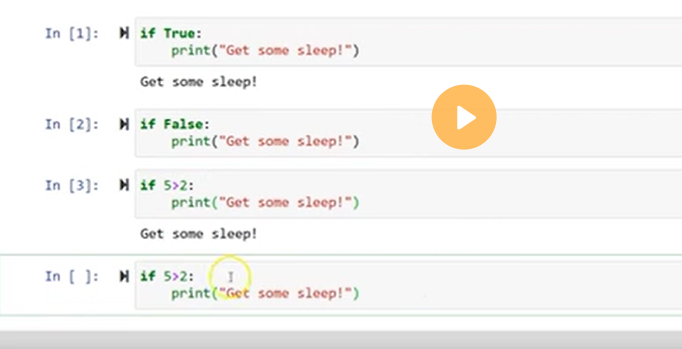Decision making is the most important aspect of almost all the programming languages. As the name implies, decision making allows us to run a particular block of code for a particular decision. Here, the decisions are made on the validity of the particular conditions. Condition checking is the backbone of decision making.
In python, decision making is performed by the following statements.
Example 2 : Program to print the largest of the three numbers.
a = int(input("Enter a? "));
b = int(input("Enter b? "));
c = int(input("Enter c? "));
if a>b and a>c:
print("a is largest");
if b>a and b>c:
print("b is largest");
if c>a and c>b:
print("c is largest");
Output:
Enter a? 100
Enter b? 120
Enter c? 130
c is largest
The elif statement
The elif statement enables us to check multiple conditions and execute the specific block of statements depending upon the true condition among them. We can have any number of elif statements in our program depending upon our need. However, using elif is optional.
The elif statement works like an if-else-if ladder statement in C. It must be succeeded by an if statement.
The syntax of the elif statement is given below.
if expression 1:
# block of statements
elif expression 2:
# block of statements
elif expression 3:
# block of statements
else:
# block of statements
Example 1
number = int(input("Enter the number?"))
if number==10:
print("number is equals to 10")
elif number==50:
print("number is equal to 50");
elif number==100:
print("number is equal to 100");
else:
print("number is not equal to 10, 50 or 100");
Output:
Enter the number?15
number is not equal to 10, 50 or 100
Example 2
marks = int(input("Enter the marks? "))
if marks > 85 and marks <= 100:
print("Congrats ! you scored grade A ...")
elif marks > 60 and marks <= 85:
print("You scored grade B + ...")
elif marks > 40 and marks <= 60:
print("You scored grade B ...")
elif (marks > 30 and marks <= 40):
print("You scored grade C ...")
else:
print("Sorry you are fail ?")





Top comments (0)